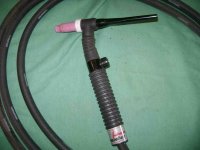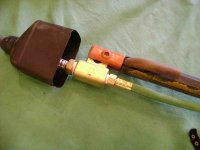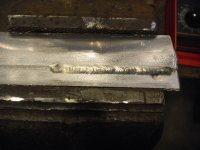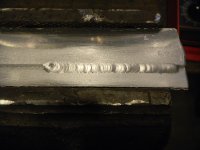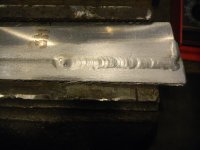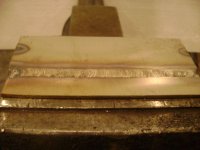Ishaboo...
Oh, where do I start. So many inaccurate and misleading statements...not enough time. You are very ill informed. From the statement about our control in the factories to the statement about mosfets. I will address the MOSFET issue from an easy to understand view: Most all welding manufacturers have left MOSFET designs for a very good reason. The only one left that I am aware of in the major players is ESAB and I think they've pretty much converted over. Their old plasma cutters were well known for a good bang or two because they were MOSFET based.
I'd respectfully disagree. I appreciate the marketing and sales that is going on, but I am trying to present honest information to the OP and not sell anything. I own a nearly new Millermatic 252 I bought in December, have had a Hobart in the past, and I'm shopping for a TIG and Plasma which will likely be one of the off-brand units due to my infrequent use and costs. I have a background in electrical engineering so I'm VERY familiar with what is being discussed here.
Yes, IGBT is "newer" technology for the newer devices but just one component in a complex electrical device. It's more applicable to the newer high-frequency machines that MOSFETs performed less favorably on. I never said that buying a MOSFET machine was the newest, most advanced piece of technology possible. I'm arguing a quality machine with MOSFETs are a good value, and that the huge failure rates are associated with poor engineering and poor quality. The switch to IGBTs came because of better high-frequency, high-amperage operating characteristics.
Miller doesn't design the electronics either...they have them made in China and imported here, with rebadged names reflecting their chips. I've got several links to Miller's factories in China. I won't air their dirty laundry here, but what you are saying is based largely upon lack of knowledge and heresay. We use name brand components, most from American based companies in our products. No we don't design the IGBT's. No we don't design the rectifiers etc. We use off the shelf components that are readily available, and don't attempt to make an electronic item an OEM only part. But we have a lot more control over some things than you think.
Quite wrong. Miller most certainly does design their electronics. But I believe you're confusing "electronics" with "semiconductors". First, nearly ALL semiconductors ("chips" and discrete components, for example) are made in East Asia, and probably 95% are not specific to an application. Any time you buy anything "Made in USA" with any circuits, those circuits are made from Asian semiconductors… there's no feasible way around it.
Miller has a team of electrical engineers who create the schematics to make a device that produces a particular welding output, build their own PCBs from scratch from discrete components and perhaps a couple FPGAs/etc., and researches, tests and analyzes their performance. At the price point, they will spec the components used to be appropriate for the duty cycle and operating conditions as well as the operation of the device, whether it be a MOSFET, IGBT, resistor, capacitor, or anything else. This is the same as how motherboards for computers or nearly any board is made for any type of device, from your laptop to your television remote.
NO manufacturer of welding equipment let alone nearly anything else in the world makes their own semiconductors, and that's highly unlikely to change in the next 50 years as there is no reason.
When a circuit is complete, like almost any other product manufactured, the board layouts are sent out to a PCB manufacturer who creates the boards, solder masks/tins/conformal coats/etc., does the pick and place, tests the boards and ships them to Miller. I doubt there are few if any chips labeled Miller as you say, but perhaps there are a couple, the most likely being FPGAs or micro controllers which are essentially generic outside of the label.
As I said and will repeat again, to my knowledge Everlast, Longevity, Giant, etc. and for sure Eastwood do NOT design the circuits or schematics that make up the welder. I am
not saying this is a bad thing, and as I've said before I am considering a TIG/Plasma from any including your own company. (Though like Longevity's fake reviews, the misleading marketing efforts are beginning to bother me. And why do you guys all copy from Miller like your navigation process images?

)
You DO find older Mosfet units from Miller and Lincoln blowing up. That's why you don't see that many around if they had very many.
I see a ton of old Millers/Lincolns around.
But welding technology has come a long way, and most companies upgrade their machines to current models offering features like easier starting, better welding, etc… which is what those circuit boards, schematics and research accomplishes. The new inverter machines are lighter and weld better.
The older welders from these name brands were not known for randomly dying or anything in a frequency higher than any other complex electrical device under the conditions they operate in. There were problem units from a few, none of which I'm familiar with had an issue with the MOSFETs blowing up.
You apparently missed the post that linked to a strong South African manufacturer of inverter welders...These guys don't play. They have 100% duty cycles in their inverters. I've known about them for some time. This isn't a Chinese thing. It's an industry thing.
Not sure how that's relevant or how I indicated I missed it?
Let me clarify "Chinese thing" however. China is perfectly capable of producing nice, quality products, which I believe the recent generation of welders you guys sell are. They're just the ONLY country capable of producing these complex products at such a LOW price point, so they get a bad rap.
Just like "don't buy Chinese", "don't buy MOSFET" is a similarly dangerous statement that restricts you from some nice value machines.
